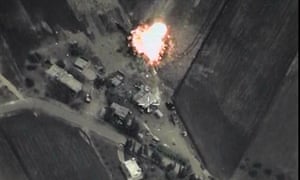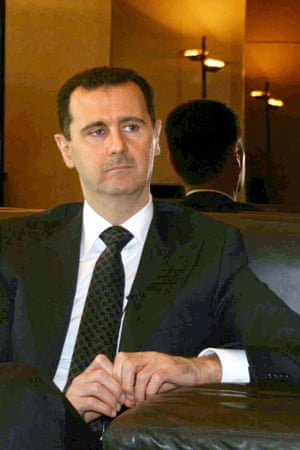Breathtaking Chutzpah
"Since the beginning of the uprising in Syria, the view in Riyadh has been that Bashar al-Assad must go. There is no indication whatsoever that Riyadh will change this position."
"What is clear to Riyadh and its regional allies is that the recent Russian and Iranian escalation will only create a more unstable region and spill more blood."
Mohammed Alyahya, associate fellow, King Faisal Centre for Research and Islamic Studies, Riyadh
"Most probably, the coming efforts will focus on boosting the effectiveness of major coalitions, co-ordination and co-operation between the most influential and effective groups in Syria.”
"There is a high-level, very close co-operation and co-ordination between Saudi Arabia, Qatar and Turkey. They are almost on the same page in Syria."
regional analyst Ali Bakeer
"The Russian intervention is a massive setback for those states backing the opposition, particularly within the region – Qatar, Saudi Arabia and Turkey – and is likely to elicit a strong response in terms of a counter-escalation."
"The uncertain question today is the degree of power combined with efficiency that regional powers will be willing to bring to the table. Do the Saudis now try to take matters decisively into their hands, including by providing rebels with sophisticated weaponry long denied them?"
"The new [Saudi] king [Salman] has shown a willingness to be much more assertive and take measures into the kingdom’s own hands. If the Saudis see the situation slipping out of their hands, and there is a real sense that the Iranians are consolidating their position in Syria, you could see much stronger response."
Julien Barnes-Dacey, senior policy fellow, European Council on Foreign Relations
 |
| Pinpoint air strikes in Syria – Russia’s military intervention is seen as more provocative than decisive by opponents of President Bashar al-Assad. Photograph: Tass |
"What is for certain is that the Western officials are lost, lack clarity of vision and are feeling the failure of their plots [towards Syria]. The only goal that was realized ... is the destruction of much infrastructure in Syria, shedding lots of blood."
"It [Russian intervention] must succeed or we are facing the destruction of a whole region, and not a country of two. The chances for success are large, not small."
"[Fighting terrorism is] the basis for any solution in Syria. The only solution for us is to strike at terrorism. Implementing any solution or political ideas agreed upon will need a state of stability Otherwise it will have no value."
"[The U.S.-led coalition against ISIL has failed]. I don't think that coalition will achieve anything except a certain balance between those forces on the ground to keep the fire raging."
Syrian President Bashar al-Assad
 |
| Countries such as Turkey, Saudi Arabia and Qatar want President Assad removed from office. Photograph: The Asahi Shimbun |
To give the man his due in looking into his particular crystal ball, at the outset of the insurrection when Syrian Sunnis protested the lack of equality under a Shiite-Alawite regime that oppressed them, the Syrian president patiently explained to the world at large that these were no mere protesters but terrorists. And, he warned, should the 'terrorists' ever get the upper hand, it would not only be Syria that would suffer; if Syria fell, a maelstrom of death and destruction would encompass the entire geography.
He came fairly close to predicting just what has occurred, except his deliberate mischaracterization of his own civilians as terrorists led to his treatment of his own civilians with the regime using the tactics of terrorism in chemical weapons and barrel bombs, siege-starvation, and the creation of an immense migration of people fleeing death from the nation's military as per the directive from the president. Yet this man asserts that Syrians themselves must make the choice of who should rule them.
In a sense his assertion that the West lost their opportunity is quite correct; instead of sitting on the sidelines while he butchered not only his civilian population, but hurled all his advanced weapons at the poorly armed rebel Syrian militias, they might have been armed to enable them to unseat their terrifying butcher-without-conscience. That opportunity is lost, gone forever, unless NATO and the U.S. can see the utility in challenging Russia in skyborne skirmishes to begin World War III.
Saudi Arabia, Qatar and Turkey, on the other hand, between them and with Egypt's aid, might convince Moscow with adequate push-back determination that the Kremlin has allowed Vladimir Putin to embark on yet another disastrous expedition. And, there is always ISIL to contend with, which, anticipating that once Russian airstrikes have sufficiently battered the rebel Syrian opposition their turn will arrive, may convince them to take their own initiative.
The Russian campaign, blatantly conspicuous for its true agenda to destroy the resources of the rebel groups rather than focusing on the Islamic State of Iraq and the Levant as they trumpeted they would, citing the failure of the United States and their coalition bombing campaign to make any inroads in their stated goal, has more than adequately demonstrated its awkward guile through its transparent moves. ISIL, controlling swaths of eastern Syria, has escaped Russia's notice.
The Russian attacks have focused on the northwestern and central provinces, precisely where the Assad regime has seen the last of its power base threatened. Where Damascus has been in danger along with Latakia and Tartus, both now firmly in Russian control with an air and a maritime base, both hosting Russian troops along with their advanced weapons of war; ships and planes and artillery and state-of-the-art missiles.
Assad touts the 'international' support Syria now has in Russia and Iran, along with its proxy Hezbollah. The Russian boast of its robust air campaign with multiple missions carried out in the course of each day and the attack of ISIL positions in Idlib, a province controlled by Jaish al-Fatah, a rebel coalition aligned with al-Nusra, not ISIL, speaks volumes of its not-so-hidden agenda.
Assad has been well coached by the master of sinister intrigue and denials of culpability. He has absorbed the methodology of the destroyer of dissent with magnificent aplomb; not for him the admission of crude tactics befitting the terrorist mould he so despises. The looming end to the setbacks that would have seen him fleeing Damascus has been averted; he can now sit back and with relief view his battle fought to the conclusion he sought.
Labels: Civil War, Conflict, Hezbollah, Iran, Islamic State, Russia, Syria
0 Comments:
Post a Comment
<< Home